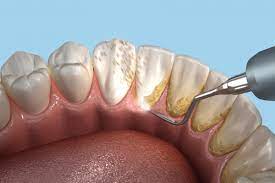Can Teeth Whitening Work on Sensitive Teeth?
Many people with sensitive teeth wonder if teeth whitening can work on sensitive teeth. It's a common concern, as teeth whitening products often contain chemicals that can irritate the nerves in your teeth, leading to discomfort or sensitivity. However, with the right products and precautions, teeth whitening can still be effective for people with sensitive teeth. In this article, we’ll explore whether Teeth Whitening(تبييض الاسنان) treatments are safe for sensitive teeth and how you can achieve a bright smile without discomfort.The Importance of Teeth Whitening for Sensitive Teeth:
Maintaining a Bright Smile Despite Sensitivity
Even if you have sensitive teeth, you might still want to enjoy the benefits of a bright, white smile. Whitening can improve your appearance, boost your confidence, and help reverse the effects of staining caused by food, drinks, or aging. It’s crucial to choose the right whitening method and products to ensure that you don’t experience discomfort during or after the treatment.
The importance of teeth whitening for sensitive teeth:
Improves appearance and restores youthful brightness
Boosts self-confidence, especially in social or professional settings
Helps reverse staining from foods like coffee, tea, and wine
Understanding your options and choosing the right products can help you safely whiten your teeth, even with sensitivity issues.
Causes of Tooth Sensitivity:
To determine whether whitening will work for you, it’s helpful to understand why you have sensitive teeth. Sensitivity can be caused by several factors, including:
Thinning enamel: When the enamel on your teeth wears down, the underlying dentin becomes exposed, leading to increased sensitivity.
Gum recession: When gums recede, the tooth roots become exposed, causing discomfort when consuming hot, cold, or sweet foods.
Tooth decay: Cavities or other dental issues can make your teeth more sensitive to whitening products.
Previous dental treatments: Fillings, crowns, or other dental procedures can affect how your teeth react to whitening agents.
Knowing the cause of your tooth sensitivity can help you choose a whitening method that will work for you.
Risks of Teeth Whitening on Sensitive Teeth:
Tooth Sensitivity and Discomfort
One of the most common risks associated with whitening sensitive teeth is increased tooth sensitivity. Whitening products, especially those containing hydrogen peroxide or carbamide peroxide, can irritate the nerves inside your teeth, causing temporary discomfort. While this sensitivity typically fades after a few hours, it can be uncomfortable during the treatment process.
Possible risks of whitening sensitive teeth:
Increased sensitivity to temperature changes (hot or cold)
Discomfort during or after the whitening procedure
Potential gum irritation if the product comes into contact with gums
To avoid these issues, it’s important to follow product instructions carefully and to use products specifically designed for sensitive teeth.
Overuse of Whitening Products:
Using whitening products too frequently can lead to enamel erosion and further increase sensitivity. Overuse can also result in uneven whitening or damage to the gums, making it crucial to use whitening products as directed by your dentist or according to the product instructions.
Benefits of Teeth Whitening for Sensitive Teeth:
Specially Formulated Products for Sensitive Teeth:
The good news is that there are teeth whitening products designed specifically for people with sensitive teeth. These products contain lower concentrations of active ingredients and are gentler on the enamel, reducing the likelihood of irritation or discomfort.
Benefits of using whitening products for sensitive teeth:
Reduced sensitivity due to gentler formulas
Effective results without discomfort
Safely brightens teeth while maintaining enamel health
These specially formulated products can offer the same brightening results as standard treatments, with less discomfort.
Professional Whitening Treatments:
If you have sensitive teeth, professional whitening treatments offered by a dentist may be the safest and most effective option. Dentists can customize the whitening process to minimize discomfort and achieve optimal results.
Custom trays and treatments can be tailored to your teeth’s sensitivity.
Professional monitoring ensures that the whitening process doesn’t cause unnecessary discomfort or damage.
Stronger results can be achieved safely under the guidance of a dentist.
Professional whitening treatments are ideal for individuals with sensitive teeth who want to achieve a significant improvement in tooth color.
FAQs About Whitening for Sensitive Teeth:
Can I Use Teeth Whitening Strips If I Have Sensitive Teeth?
Yes, there are whitening strips specifically designed for sensitive teeth. These products typically contain a lower concentration of peroxide to minimize irritation while still providing noticeable results. It’s important to choose a reputable brand and follow the directions carefully.
How Can I Minimize Tooth Sensitivity During Whitening?
To reduce tooth sensitivity, you can:
Use a toothpaste for sensitive teeth before and after whitening treatments.
Take breaks between whitening sessions to give your teeth time to recover.
Apply desensitizing gel or use over-the-counter products specifically designed to protect sensitive teeth.
If sensitivity becomes unbearable, it’s important to stop using the whitening product and consult your dentist.
How Long Will the Results Last for Sensitive Teeth?
The results of teeth whitening for sensitive teeth generally last the same amount of time as those for non-sensitive teeth. On average, whitening results can last anywhere from 6 months to 2 years, depending on your oral hygiene habits and diet. To prolong the results, avoid foods and drinks that stain your teeth, such as coffee, tea, and red wine.
Conclusion:
In conclusion, teeth whitening can work on sensitive teeth, but it requires special care and consideration. By choosing the right products designed for sensitive teeth and following instructions carefully, you can achieve a bright smile without discomfort. Whether you opt for over-the-counter products, at-home treatments, or professional whitening services, it’s important to consult with your dentist to ensure the treatment is appropriate for your needs. With the proper approach, it’s entirely possible to whiten your teeth safely and effectively, even if you have sensitive teeth.
Teeth whitening brightens your smile by removing stains and discoloration, giving you a radiant, con
